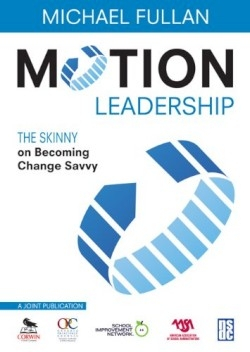Motion Leadership
The Skinny on Becoming Change Savvy
Motion Leadership proves the old adage that good things come in small packages. A mere 85 pages and nine short chapters, Michael Fullan’s latest book is tightly packed with wise advice and illustrated by relevant examples.
Internationally known for his consulting work in educational reform and Professor Emeritus at the University of Toronto, Fullan has been publishing widely-read books and articles in this arena for the last 30-some years. He points out that this book is actually a precursor to an audiovisual, interactive experience that will be available as an online course in 2010. Motion Leadership, says Fullan, contains “basic ideas and insights about change.” While the target audience is educational administrators, it is likely that business leaders will benefit from this book as well.
Fullan identifies eight key elements in his discussion, including change and problems with change; how to connect peers to purpose; transparency; trust; and resistance. For him, building an organization’s capacity and engaging everyone in leadership are primary goals that trump any temptation to indulge in judgmental behavior.
To maintain a story line, Fullan follows the leadership experiences of renowned London chef Jamie Oliver throughout the book. Oliver takes on the challenge of changing the food served at not one but sixty English schools. Oliver’s trials and tribulations become emblematic of the principles of “Motion Leadership,” so named because Fullan and his team found that their work “was helping leaders ‘move’ individuals, institutions, and whole systems forward.” As each chapter unfolds, Oliver learns, among other things, how to avoid being judgmental and how to engage a key “head dinner lady,” enlisting her in his cause to improve food quality.
Fullan addresses several major points about leadership in an engaging and provocative manner. He says “leaders must develop relationships first to a degree before they can push challenges,” suggesting that the headstrong leader who comes into a new situation should respect the organization’s culture but not become its victim. Leaders, says Fullan, should “strive for small early successes” and be ready to “admit mistakes.” Motion Leadership focuses on positive action and shared ownership because, says Fullan, “nothing succeeds like collective capacity.”
Perhaps one of the book’s most compelling arguments concerns the issue of transparency. Fullan believes transparency is mandatory because “you cannot get system reform without knowing what is being accomplished and who is getting success.” He urges leaders to be open about their plans, saying that trusting transparency “is one of the most sophisticated components of leadership.”
Finally, says Fullan, becoming savvy about change “makes you more confident and humble at the same time.” His wise counsel is something every aspiring leader should take to heart.
Review Date: January 2010.
Disclosure: This article is not an endorsement, but a review. The publisher of this book provided free copies of the book and paid a small fee to have their book reviewed by a professional reviewer. Foreword Reviews and Clarion Reviews make no guarantee that the publisher will receive a positive review. Foreword Magazine, Inc. is disclosing this in accordance with the Federal Trade Commission’s 16 CFR, Part 255.

